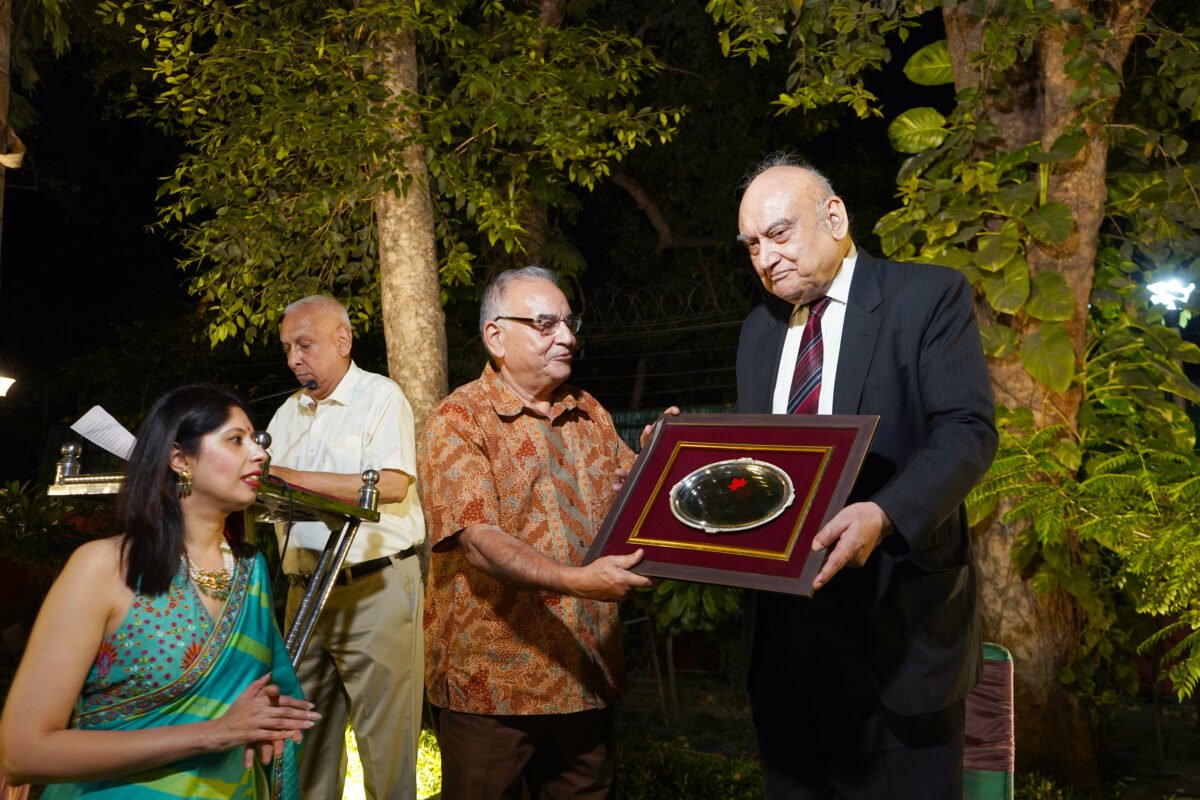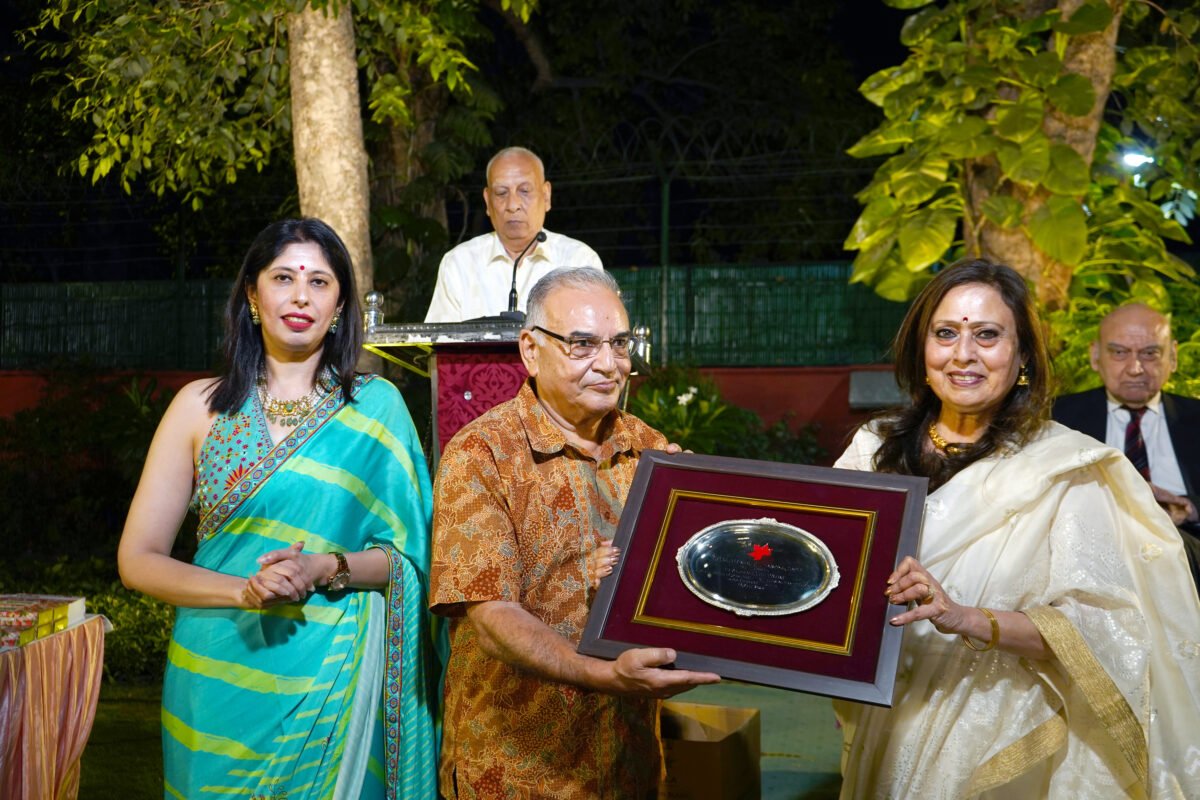Yesterday, 6th April 2024, the Kashmiri Pandits Association, an association of the non Kashmiri speaking Kashmiri Pandits, ( Kashmiri speaking Kashmiri Pandits have their own association called All India Kashmiri Samaj ), held a function in Delhi to honour me and Anita Mulla, the daughter of the heroic Capt MN Mulla who went down with his ship Kukri in the war against Pakistan, in the tradition of the Navy.

https://en.wikipedia.org/wiki/Mahendra_Nath_Mulla
Kashmiri Pandits ( hereafter referred to as KPs ) are of two types, Kashmiri speaking, and non Kashmiri speaking, the former being about 400,000 in number, and the latter a little less than half of that. The latter, which includes me, are those whose ancestors migrated from Kashmir to the plains of India about 200 years ago, while the former are those who remained in the Kashmir valley until they were driven out by persecution in the 1990s.
Kashmiri is a language totally different from Hindi, and a Hindi speaker will not be able to understand it. Though our ancestors who migrated from Kashmir no doubt spoke Kashmiri, their descendants forgot it after a couple of generations or so, and could thereafter speak only Hindi and English.
However they retained their Kashmiri Pandit identity by marrying only among themselves and not with the local people ( now of course many have married outside the community ). They retained their Kashmiri food habits, being non vegetarians, and eating Kashmiri delicacies like roganjosh, kabargaah, damaloo, etc.
Though they had forgotten the Kashmiri language, in certain rituals like Herat puja they would utter some Kashmiri words which had been passed on for generations, without understanding a word of what they meant ( just as many people recite Sanskrit shlokas without understanding their meaning ). These too became distorted over the generations. For instance, the Kashmiri words ‘kus choo’ ( who is it ? ) became ‘kuch choo’. It was only after I married my wife Rupa, who is a Kashmiri speaking Kashmiri Pandit, that she told me the meaning and correct pronunciation of these words.
The non Kashmiri speaking KPs left Kashmir not because of persecution but for job opportunities. To understand this I must tell something about the history of KPs.
Kashmir was conquered by Mughal Emperor Akbar in 1588 who deposed the last independent ruler of Kashmir Yusuf Shah Chak, and incorporated Kashmir into the Mughal Empire.
Mughal rule was beneficial to KPs. At that time KPs comprised of only about 5% of the total Kashmiri population, the rest having converted to islam. The Mughals needed a buffer between themselves and the local Muslim population, so they made KPs landlords, whose tenants/servants were the local Muslims.
KPs not only became landlords but were also the educated class in Kashmir ( Kashmiri Muslims then being almost all illiterate ), and they were very proficient in Persian and Urdu, which were the languages of the elite in the entire Indian subcontinent.
Because they were proficient in Persian and Urdu, KPs were in great demand in the princely states, where the court languages were Persian and Urdu.
During British rule part of India was under direct British rule, and part under the princely states i.e, states ruled by Maharajas and Nawabs ( who, however, recognised the paramountcy of the British ). Most of eastern India was under direct British rule, since Bengal was the first big base of the British in India after the batles of Plassey ( 1757 ) and Buxar ( 1764 ), and from there British rule expanded westward. The Maharajas of western and central India ( Punjab, Rajasthan, Madhya Pradesh, etc ) were allowed to continue their rule ( though recognising British paramountcy ), and, as mentioned above, their court languages ( even of Hindu rulers ) were Persian and Urdu.
The ancestors of all non Kashmiri speaking KPs came to the plains of India in exactly the same way (whether the ancestor of former Prime Minister Jawaharlal Nehru, the eminent lawyer Sir Tej Bahadur Sapru, or any others ), that is, they got jobs as officials in the courts of Maharaja and Nawabs ( because of their proficiency in Persian and Urdu ). They were trustworthy, industrious, and men of honour, and soon rose to high positions, many even becoming Dewans ( equivalent to Prime Minister ) in their states.
My own ancestor Pt Mansa Ram Katju, who migrated from Kashmir abouit 200 years ago, got employment as an official in the court of the Nawab of Jaora, which was a princely state in western MP bordering Rajasthan, and for many generations his descendants served there. Pt Mansa Ram wrote in the register of a panda in Kurukshetra ”Ba-talaash-e-maash aamadam ” ( i.e. I have come in quest of bread )
The descendant of the KP immigrants, too, became court officials in the princely states, but after a few generations some branched off and joined the legal profession as lawyers. This happened because KPs were an intellectual class, not physical labourers, and the only avenue then available to intellectuals was the legal profession. There was no IAS at that time, and the ICS recruited mainly Britishers.
At that time most lawyers in India were sons of zamindars ( landlords ). This was because in those days a new lawyer would not earn anything for the first 4-5 years of his law practice, and so only sons of zamindars could sustain themselves in the early years of their practice as they received some allowances from their zamindar father.
The problem for KPs who entered the legal profession was that they had no zamindari. Hence they had to earn from almost the start of their practice, and for this they had to work hard day and night to quickly master the law. They soon gained a reputation for their knowledge of law and uprightness, and started getting clients. They quickly rose high, and became the top lawyers. Thus, in UP not only some of the top lawyers in the Allahabad High Court like Sir Tej Bahadur Sapru, Pt Moti Lal Nehru, Dr KN Katju etc were KPs, even in about half the district courts in UP the top lawyer was a KP, e.g. Prithvinath Chak in Kanpur, Shangloo saheb in Fyzabad ( now Ayodhya ), Anand Narain Tankha in Dehra Dun, Bakshi saheb in Hardoi, Masaldan saheb ( father of the President of KPA Gen Masaldan ) in Sitapur, etc.
Similar was the position in many other states, e.g. Raj Kumar Tankha
who started his law practice in Rewa district court and became a Judge of the MP High Court at a very young age, and in all likelihood would have become the Chief Justice of India ( as he was senior to Justice JS Verma who became CJI ) but for his untimely death at the age of 51. His son Vivek Tankha is today a top lawyer of India, as well as an MP.
I may also mention Justice Shambhu Nath Pandit, a KP, who became the first Indian Judge of a High Court in 1863.
Later, when more avenues were opened up, KPs went into the corporate sector, became professors, doctors, engineers, etc, and many have migrated to USA and elsewehere, where they have done very well.
I am adding some pics of yesterday’s function







